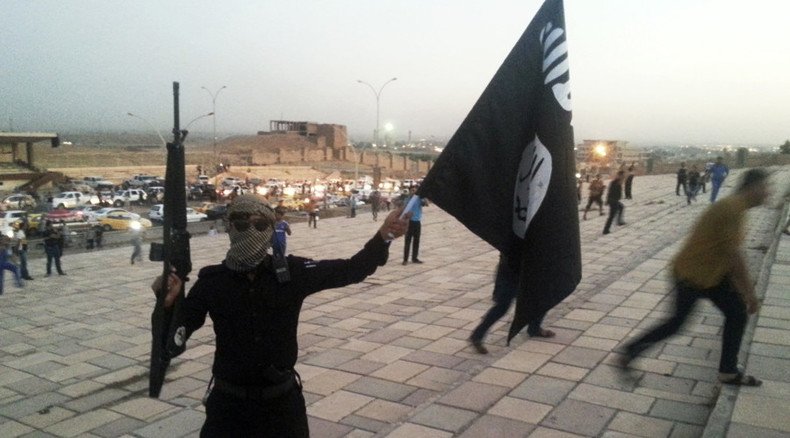ISIS could have been prevented – if it hadn’t been deliberately fostered

In an interview with Fox News earlier this week, retiring US Chief of Staff Ray Odierno said that the US could have prevented the rise of ISIS. He is absolutely correct: but his reasoning is topsy-turvy. Whilst he blames the group’s rise on a lack of US military intervention, the truth is precisely the opposite.
“If we had stayed a little more engaged, I think maybe it might have been prevented,” he said, echoing a common view in neo-con circles that aims to pin the rise of ISIS on a supposed ‘lack of commitment’ to Iraq by the US under President Obama. He continues: “I go back to the work we did in 2007, 2008, 2009, and 2010 and we got it to a place that was really good. Violence was low, the economy was growing, politics looked like it was heading in the right direction.”
What Odierno fails to note is that none of this actually served US strategic policy aims.
Odierno speaks as if the sole aim of the US military is to help impoverished and war-torn third world countries develop in peace. Nothing could be further from the truth; the ultimate purpose of the US military is to preserve not peace and stability, but rather US global domination. True, there was a time when there was a certain convergence of these goals. During, and immediately after, the Cold War, stability was a tool of domination; or at least the stability of capitalist states was. Ensuring such states remained stable was key both to ensuring the neo-colonial extraction of their resources and to preventing their falling into the Soviet ‘sphere of influence’.
READ MORE: British ISIS fighter killed in Syria airstrike, tweet suggests
Of course, destabilization was used, and often, against socialist, nationalist or Soviet-allied states. But, by and large, capitalist regimes could generally be relied on to side with the US, and the US, therefore, tended to desire their stability.
Fast-forward to 2011, however, and this is no longer the case. Stable states – of whatever ideological orientation - are increasingly a threat to continued US domination, rather than a tool of it. Nothing could illustrate this better than the case of post-invasion Iraq.
Two years ago, the US ‘think tank’ Jamestown Foundation published a fascinating analysis of China’s oil policy in Iraq. This report described, in detail, how China had become the main winner of oil contracts under the new Iraqi government, and had helped restore the battered industry back to impressive production levels. “China was able to secure the first major oil accord between the Iraqi government and a foreign entity since 2003,” the report notes, when “in 2008, China’s state-owned China National Petroleum Corporation (CNPC) concluded a $3.5 billion deal with Iraq’s North Oil Company (NOC) to develop the al-Ahdab oil field—a relatively small oil field by Iraqi standards—in the province of al-Wasit.”
While unlikely to prove a particularly lucrative investment in itself, its significance was as “an early foothold in the Iraqi oil sector that would lay the groundwork for future dealings on larger and more lucrative projects.” Indeed, this turned out to be the case, with a deal signed the following year giving a joint venture between BP and CNPC access to Iraq’s biggest oil field Rumalia. Further deals followed, including a 20-year agreement over the Missan oilfield in 2010, with the result that “at least one third of all future production of Iraqi oil will be derived from oil fields owned outright or co-owned by Chinese concerns.”
READ MORE: ‘Neither US or UK interested in fighting extremism’
The report noted that half a million barrels of Iraqi oil per day were flowing to China, whilst a report by a Forbes blogger estimated that this number had tripled to 1.5 billion barrels per day less than eighteen months later. As Jamestown put it: “In light of the widely-touted opinion that the United States invaded Iraq, in large part, to dominate its energy reserves, it is important to highlight the tremendous inroads made by China in the Iraqi energy sector following the fall of Saddam Hussein. While U.S. and other Western oil majors have reaped substantial profits in Iraq, it would appear that China, for numerous reasons, was able to realize disproportionate gains in the Iraqi energy sector.”
The gradual re-emergence of a functioning Iraqi economy, then, was benefiting not the US, but rather the US’s number one strategic rival, China. Iraq’s peaceful development, in this context, was proving to be a direct threat to continued US domination.
Nor was this growing Iraqi-China co-operation solely economic. Jamestown’s report concluded that “the convergence of mutual interests between China and Iraq over the buying and selling of oil will serve to underpin a long-term strategic partnership.” A long-term strategic partnership between Iraq and China? Is this what the US spent $3 trillion to bring about?
It is important to note here, however, that the US itself does not actually need Iraqi oil. As Gordon Chang noted in Forbes, it is rapidly reducing its dependence on energy imports altogether: “The US overtook Russia as the world’s biggest natural gas producer in 2012 and is, after Saudi Arabia and Russia, the third biggest pumper of oil,” Chang said. “US energy imports have fallen in the last five years, natural gas by 32 percent and oil by 15 percent.” He concludes: “So a crisis [in Iraqi oil production] would put America in an even stronger position in the oil and gas markets.” Just to clarify that last point, the article repeated it: “Chang….noted that the United States would actually be in a stronger economic position with Iraqi oil off the market.”
This is the context in which the rise of ISIS has to be read. A stable Iraq, able to develop its oil infrastructure in peace, has turned out to be not only unnecessary to the US project of global domination, but actually antithetical to it. The Pivot to Asia, then – that is, the attempt to block and stifle China’s rise - is not separate from US policy towards Iraq: a destabilized, dysfunctional Iraq is an integral part of it.
Nor should the removal of most US troops from overt street patrols in 2011 be read as a ‘withdrawal’ in any meaningful sense. The US remained deeply involved in the region’s politics, sparking off a renewed intensification of violence across the entire Middle East-North Africa region, through both its seven month blitzkrieg against Libya, and its overt sponsorship and patronage of a vicious sectarian insurgency in Syria, all of which had predictable consequences for Iraq: As Patrick Cockburn noted in the Independent: “For 18 months, Iraqi leaders have told anybody who would listen that the opposition in Syria was dominated by jihadis such as Isis, Jabhat al-Nusra (the official Al-Qaeda representative) and Ahrar al-Sham. The Iraqis expressed complete conviction that unless the US did something to close down the civil war in Syria then this would inevitably destabilize Iraq.”
Indeed, we now know that the US Defense Intelligence Agency was saying the same thing as far back as 2012. Far from ‘withdrawing’ from Iraq, the US has simply switched from using its own soldiers to achieve its strategic goals, to training and funding sectarian ‘jihadi’ death squads to do the same.
The very language of a ‘Pivot’ to Asia is thus a total mystification, suggesting a turning away from the Middle East (which, it is always forgotten, is in Asia as well), when in fact the US destabilization of Iraq is part and parcel of the fight against China.
So Odierno is right: the US could have prevented the rise of ISIS. But with ISIS leading the fight to cripple one of China’s most important strategic allies, one has to ask: Why would it have wanted to do that?
The statements, views and opinions expressed in this column are solely those of the author and do not necessarily represent those of RT.
The statements, views and opinions expressed in this column are solely those of the author and do not necessarily represent those of RT.













